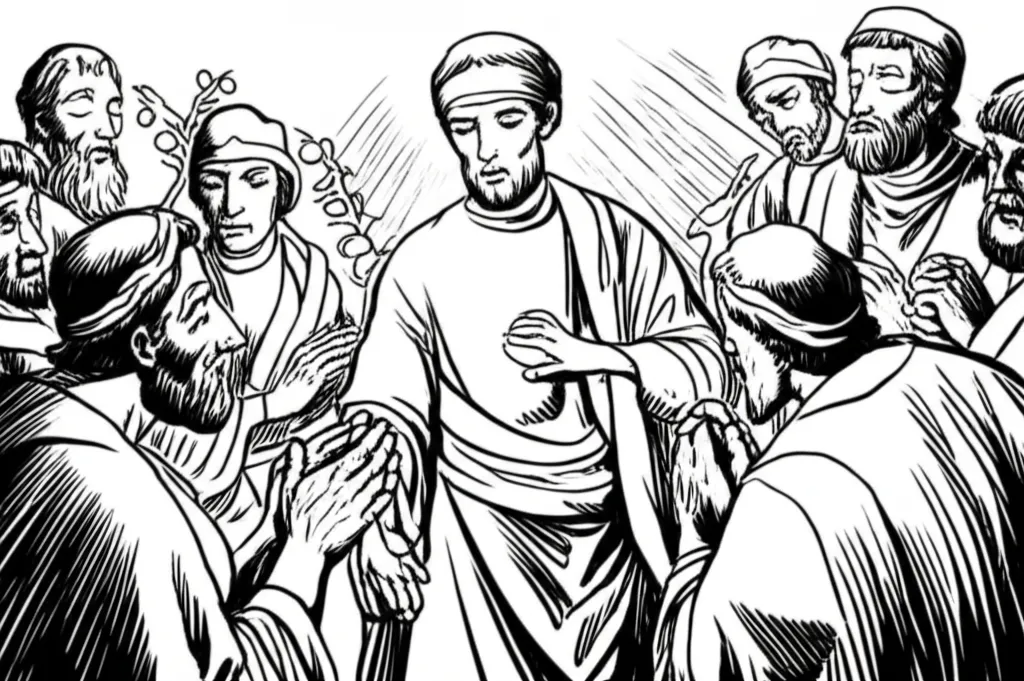Today, as we celebrate the Feast of Saint Matthias, Apostle, we are reminded of the enduring nature of faith, the importance of community, and the call to service that resonates through the ages. The readings offer a powerful message of continuity and renewal, urging us to reflect on our own roles in the unfolding story of salvation.
Filling the Void: A Call to Service
The first reading from the Acts of the Apostles (Acts 1:15-17, 20-26) recounts the selection of Matthias to replace Judas among the Twelve. This passage is more than a historical account; it's a profound lesson in addressing the voids that arise in our own lives and communities. Judas' betrayal left a vacancy, a wound in the heart of the early Church. Peter, guided by the Holy Spirit and the prophetic words of the Psalms, recognized the need to fill this void.
In our lives, we often encounter similar vacancies – absences of love, justice, or compassion. Perhaps it's a friend in need, a community struggling with poverty, or a personal failing that needs addressing. Like Matthias, we are called to step forward, to offer ourselves as instruments of healing and restoration. The apostles sought someone who had been with them from the beginning, a witness to the life, death, and resurrection of Jesus. This highlights the importance of experience and deep-rooted faith in service. It reminds us that our actions should be grounded in a genuine encounter with Christ.
Divine Choice and Human Agency
The selection of Matthias is particularly interesting because of the method used: prayer and the casting of lots. The apostles prayed, "You, Lord, who know the hearts of all, show which one of these two you have chosen." This moment underscores the delicate balance between divine will and human agency. While the apostles took action, proposing candidates and casting lots, they ultimately trusted in God's wisdom to guide their decision.
This resonates deeply with the complexities of our own lives. We are called to make choices, to use our intellect and discernment, but always with a humble recognition that God's plan transcends our understanding. We must strive to align our will with the divine will, trusting that even in moments of uncertainty, God is at work, guiding us toward a greater purpose. This echoes the sentiment that our hearts are restless until they rest in Him, a journey of self-discovery guided by divine grace.
Abiding in Love: The Essence of Discipleship
In the Gospel reading (John 15:9-17), Jesus speaks of love as the very essence of discipleship: "As the Father loves me, so I also love you. Remain in my love." This is not a passive sentiment but an active call to abide in Christ's love through obedience to his commandments. Jesus emphasizes that keeping his commandments is the way to remain in his love, just as he kept his Father's commandments.
This concept challenges us to examine our own lives. Are we truly living in accordance with Christ's teachings? Are we striving to love one another as he loved us? This love is not merely an emotion but a deliberate act of will, a commitment to selflessness and sacrifice. It is about recognizing the inherent dignity of every human being and treating them with compassion and respect, even when it is difficult.
Friendship and Sacrifice
Jesus elevates his disciples from the status of slaves to friends, declaring, "I no longer call you slaves, because a slave does not know what his master is doing. I have called you friends, because I have told you everything I have heard from my Father." This intimate relationship is built on trust, transparency, and shared purpose. It also carries a profound responsibility.
Jesus states, "No one has greater love than this, to lay down one’s life for one’s friends." This is the ultimate expression of love, a willingness to sacrifice everything for the sake of others. While we may not be called to literally lay down our lives, we are called to make sacrifices – of our time, our resources, our comfort – for the well-being of those around us. This echoes the call to ethical and social justice, urging us to care for the marginalized and to stand in solidarity with those who are suffering.
Bearing Fruit That Will Last
Finally, Jesus reminds his disciples, "It was not you who chose me, but I who chose you and appointed you to go and bear fruit that will remain." This is a powerful reminder that our calling is not self-generated but divinely ordained. We are chosen, not because of our own merits, but because of God's grace. And we are appointed to bear fruit – to live lives that are pleasing to God and that contribute to the building of his kingdom.
This fruit is not merely material success or worldly recognition but the virtues of love, joy, peace, patience, kindness, goodness, faithfulness, gentleness, and self-control (Galatians 5:22-23). These are the qualities that transform us into the image of Christ and that leave a lasting impact on the world. It is through these virtues that we can truly become witnesses to the resurrection, just as Matthias was chosen to be.
As we celebrate Saint Matthias, let us be inspired by his example of faithfulness and service. Let us embrace our own calling to fill the voids in our world with love, justice, and compassion. And let us strive to bear fruit that will remain, so that our lives may be a testament to the enduring power of God's grace.
